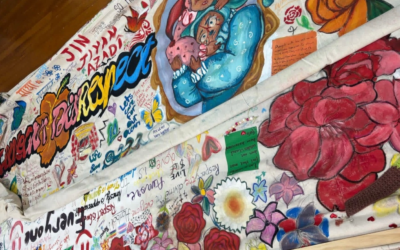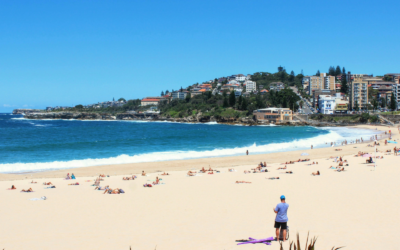Sebastian is a WSU student studying a Bachelor of Economics. At 23 years old, he is inspired to educate the university student body on the dangers of microplastics, and the several projects behind further investigating it’s effect on the environment. Interviewed by former W’SUP editor, Dania Roumieh, Sebastian shares his research on microplastics to raise awareness of the several ways microplastics affect organisms and the environment.
What was the inspiration to join the Sustainability Education team?
“As an economics student, you’re always involved with these concepts, that everything is limited. So, we like to study, ‘how can we use these resources in the best possibly way’. So, from that principle, I’ve been interested about sustainability. I had the opportunity to do these units about circular economy, which is related to sustainability.

Sebastian at WSU (Credit: Sebastian Florian Guzman)
Circular economy says that everything should be reused – our clothes, plastic bottles, everything should be reused. We shouldn’t have to waste in our economy, that’s what got me inspired behind this university”.
How are microplastics impacting our environment today?
“Microplastics are small particles of plastic, less than five millimetres in size. They aren’t visible to the naked eye. You find these microplastics in cosmetics too. It affects us all because when micro-plastics are going to rivers or oceans and small plants too. The small fish eat this, and the big fish eat the smaller fish, right?

Figure 2: Sebastian during his project (Credit: (Credit: Sebastian Florian Guzman)
When animals eat these microplastics, it affects their body. So, when the microplastics are in the ocean, they absorb chemicals that you can find in the environment. So, the microplastic enters the food chain, and we will end up consuming.
It not only affects the fish in the ocean, but the consequences of those microplastics have in our body is a huge issue. Like when we wash our clothes, we put it in the washing machine, and this is like one of the biggest principal resources of microplastics. We can find microplastics in our clothes because of the synthetic materials like nylon.
Once our clothes are in the washing machine, these fibred from our own clothes go into the waterways and all end up in the oceans. How can we fight this problem or avoid these problems? It’s not that difficult. We can use bag filters for our washing machines, they’re a little bit expensive but worth it”

Figure 3: Research in progress (Credit: Sebastian Florian Guzman)
What do you say to the WSU student body regarding this project?
“I would like to tell everyone to educate themselves about microplastics because I know that many people have never heard of this before. I studied and read up on all these facts, and researched microplastics with the university. It’s a very important topic to discuss and research about”

Figure 4: Sebastian and his research team (Credit: Sebastian Florian Guzman)


